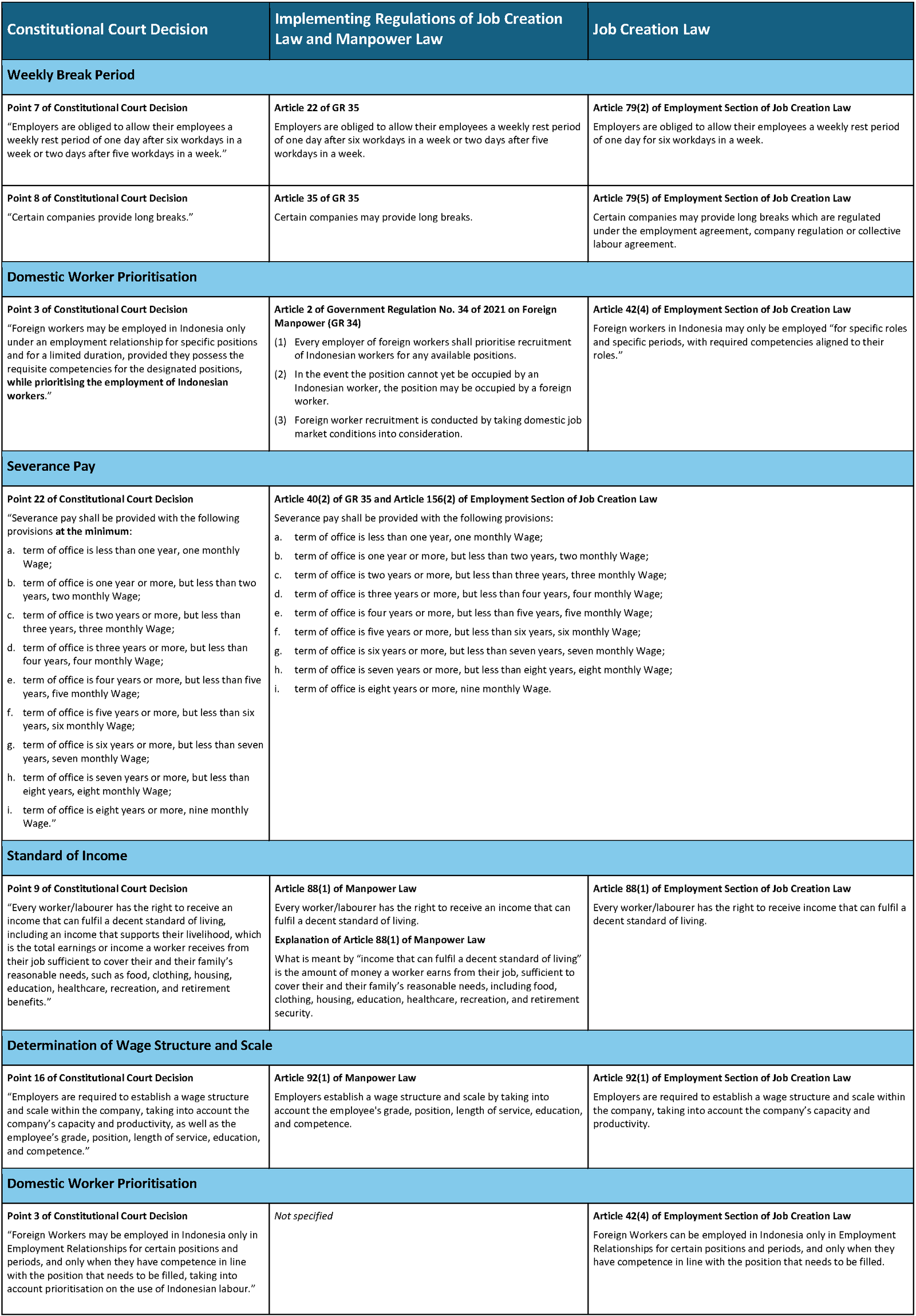You are here
Back to topOn 1 December 2023, a coalition of labour organisations in Indonesia filed for a judicial review seeking amendments to Law No. 6 of 2023 on Stipulation of Government Regulation in Lieu of Law No. 2 of 2022 on Job Creation (the Job Creation Law). Changes were requested to at least 70 articles of this law, which focuses on various aspects of employment.
On 31 October 2024, Indonesia’s Constitutional Court issued Decision No. 168/PUU-XXI/2023 (the Constitutional Court Decision), which partially granted the petition for a judicial review of the Job Creation Law.
OVERVIEW OF CONSTITUTIONAL COURT DECISION
The Constitutional Court Decision affects the interpretation of 21 articles of the Job Creation Law regarding employment arrangements. It also makes various clarifications essentially affirming provisions already contained in the implementing regulations of the Job Creation Law.
We set out below five key changes under the Constitutional Court Decision that employers need to consider.
FIVE-YEAR LIMITATION ON ALL TYPES OF FIXED TERM CONTRACTS (FTCs)
The Job Creation Law recognises two types of FTCs: (i) FTCs based on a specified time period and (ii) FTCs based on completion of certain work.
Under Government Regulation No. 35 of 2021 on Fixed-term Employment, Outsourcing, Hours of Work and Termination of Employment (GR 35), while FTCs based on a time period already had a maximum duration of five years (including any extensions), FTCs based on the completion of work had no explicit time limit (being governed solely by the agreement between the parties in the employment contract on the completion of work). Now, following the Constitutional Court Decision, both types of FTC now have a maximum duration of five years, including any extensions.
OBLIGATION TO PAY WAGES THROUGHOUT TERMINATION PROCESS
The Job Creation Law stipulated that both the company and the employee must fulfil their obligations until the termination process is completed through the industrial relations dispute resolution process. The Constitutional Court Decision now makes it clear that the parties should fulfil their respective obligations throughout the dispute resolution process, up until a final and binding decision is reached. Should there be an appeal, then a final and binding decision will only be reached after the issuance of a Supreme Court decision at the cassation level.
On initial reading, the Constitutional Court Decision reaffirms what is already in the Job Creation Law. However, the Constitutional Court Decision differs from Supreme Court Circular Letter No. 3/2015, which had limited the employer’s obligation to pay wages during an industrial dispute to a maximum period of six months.
EMPHASISING CERTAINTY IN TERMINATION PROCEDURES
The Constitutional Court has clarified the process for resolving industrial disputes, emphasising that if bipartite negotiations fail, termination can only proceed after a legally binding court decision.
LABOUR UNIONS TO NEGOTIATE WAGES WITH EMPLOYER
The Constitutional Court has broadened the scope of wage negotiations, allowing labour unions within companies to negotiate agreements with employers on wages above the minimum wage. Under the Job Creation Law, this negotiation right was restricted to individual employees. While this change empowers labour unions to negotiate on behalf of their members, it is not clear how labour union involvement in these negotiations will take place in practice.
The Constitutional Court’s interpretation of this Job Creation Law provision essentially allows for wages above the minimum wage to be determined through an agreement between the employer and the relevant employee or labour union.
NARROWING DOWN TYPES OF OUTSOURCED WORK
The Constitutional Court Decision has established a foundation for further regulations specifying the types of work that can be outsourced. However, additional follow-up action will need to be determined by Indonesia’s Ministry of Manpower. Once the Ministry issues these implementing regulations, there will be greater legal certainty on which outsourcing practices are permissible and which are not.
REINSTATING KEY PROVISIONS FOR GREATER CLARITY AND ENFORCEMENT
In addition to the changes above, the Constitutional Court Decision has amended several provisions of the Job Creation Law to align with its implementing regulations and Law No. 13 of 2003 on Manpower (the Manpower Law). Notable provisions amended by the Constitutional Court Decision are set out in the accompanying table (with emphasis added).

IMPLEMENTATION OF CONSTITUTIONAL COURT DECISION
The Constitutional Court recognises that the substantial changes made to the Manpower Law and the Job Creation Law could lead to interpretive challenges, which may potentially disadvantage both employers and employees. To address this, the Court has instructed lawmakers to enact a new, standalone manpower law, separating the Manpower Law from the Job Creation Law, within two years from the date of its decision. Until this new manpower law is enacted, the Job Creation Law remains in effect, subject to the revisions set out in the Constitutional Court Decision.




